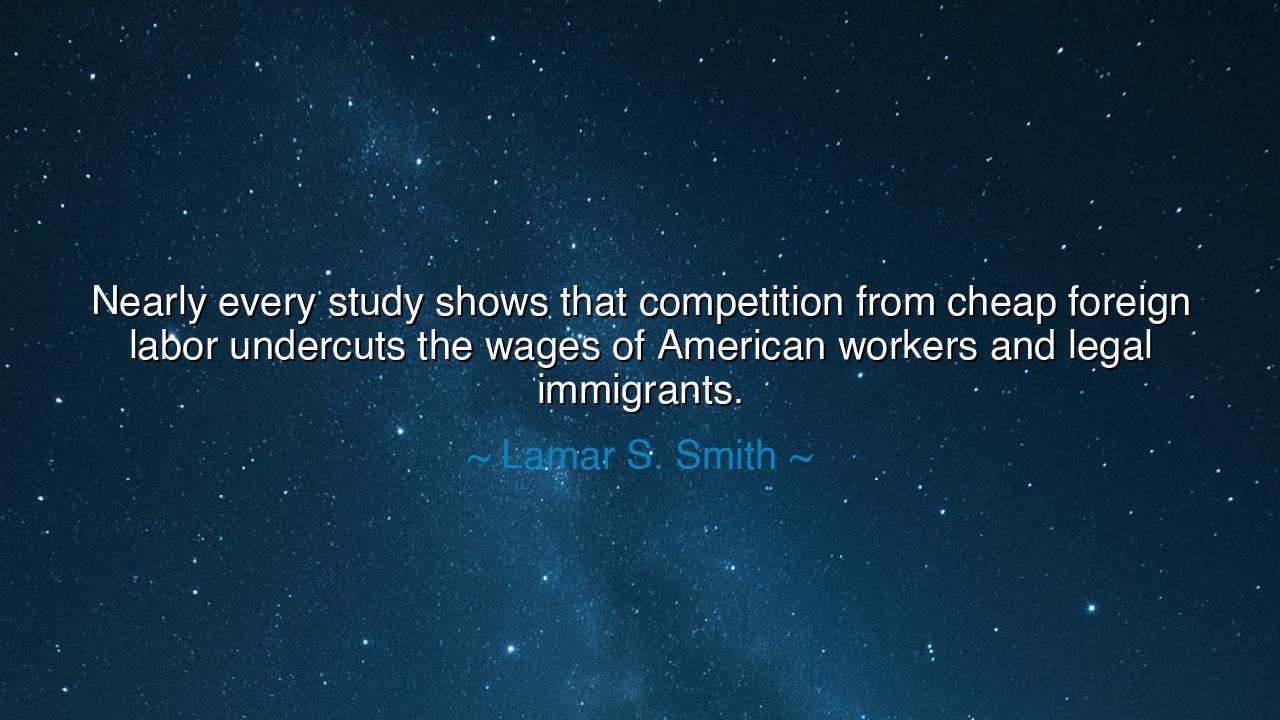
Nearly every study shows that competition from cheap foreign
Nearly every study shows that competition from cheap foreign labor undercuts the wages of American workers and legal immigrants.






Hear the words of Lamar S. Smith, spoken with solemn gravity: “Nearly every study shows that competition from cheap foreign labor undercuts the wages of American workers and legal immigrants.” This declaration is not made lightly, but with the weight of evidence and the sorrow of observing how global tides can wash against the foundations of local prosperity. He names a struggle as old as labor itself: when the value of one’s work is diminished by the influx of cheaper hands, the dignity of the worker is threatened, and the harmony of society trembles.
When Smith speaks of “cheap foreign labor,” he does not scorn the worker who crosses oceans or borders in search of survival. Rather, he warns of systems and policies that allow such labor to be used as a tool—not for mutual enrichment, but for exploitation. For when wages are driven down by the easy availability of cheaper alternatives, the native-born and the legal immigrant alike find themselves cast into competition that breeds resentment and despair. The wound is not only economic but moral, for it divides neighbor against neighbor and turns the worker into a pawn.
The phrase “undercuts the wages” is powerful, for it conjures the image of a foundation being hacked away from beneath a house. A home may stand tall, yet if its base is weakened, collapse is only a matter of time. So too with the wages of workers: when they are undercut, families strain, communities weaken, and the promise of upward mobility—the very promise of America—fades into illusion. The warning Smith gives is not just about money, but about the erosion of the great covenant between a nation and those who labor for its future.
History offers a vivid lesson in the story of the Industrial Revolution in Britain. As factories rose, owners sought ever cheaper labor, employing women and children for pennies while men who had long supported their families with craft and trade saw their wages plummet. Riots and strikes erupted, not because the workers despised progress, but because they felt crushed beneath its weight. Laws eventually arose to balance the scales, to protect wages and limit exploitation. This history teaches us that unchecked pursuit of cheap labor, whether foreign or domestic, inevitably leads to unrest, injustice, and division.
The deeper meaning of Smith’s words is this: a nation’s prosperity must rest upon fairness to its workers. To allow wages to be undercut is to declare that loyalty, skill, and legality matter less than price. Such a path leads not only to poverty for many, but to bitterness that corrodes the unity of a people. It is a call to remember that labor is not merely a cost to be minimized but a covenant to be honored—a bond between employer and worker, between nation and citizen.
Yet his words also remind us of the shared humanity of all who labor, whether native or foreign. The problem is not the foreign worker, who also seeks dignity, but the structures that pit one against another, making both suffer. Thus, solutions must not be born of hatred, but of wisdom—creating systems where legal immigrants are protected, where citizens are uplifted, and where foreign labor is not used as a weapon to destroy the livelihood of those already within the nation’s fold.
Children of tomorrow, let this teaching be carved into your hearts: do not measure labor only by cost, but by its dignity. Support leaders who defend fair wages for all who work lawfully. Do not despise the foreigner, but resist the policies that use his poverty to break your brother’s strength. In your own choices, honor the worker by seeking fairness in how you buy, how you hire, and how you live. For a society that forgets the worth of labor will soon forget the worth of life itself.
Thus, the wisdom of Smith’s words endures: that cheap foreign labor, when misused, is not a blessing but a burden; that it undercuts wages and corrodes justice; and that the true strength of a nation lies not in exploiting the cheapest hand, but in honoring the work of every lawful and loyal soul. This is the path of dignity, the road of justice, and the teaching we must pass down if we would build a society both prosperous and fair.






AAdministratorAdministrator
Welcome, honored guests. Please leave a comment, we will respond soon